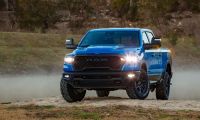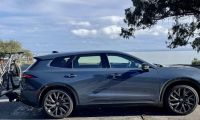It is getting hard to keep track of Tesla’s state-by-state battles with auto dealer lobbies and politicians over the automaker’s direct sales model. Tesla is currently banned from selling its vehicles in Arizona, Maryland, Texas and Virginia, where it is only permitted to open “galleries” that cannot facilitate sales. (Actual purchases may be made online).
The picture is more confusing in states like Colorado, Georgia, New Jersey, Ohio, and Pennsylvania, which are in various states of legal proceedings or have compromised by only allowing a limited number of Tesla stores.
On the bright side, Massachusetts, Minnesota, Nevada, New York, and North Carolina have relatively recently either lifted or struck down proposed bans on Tesla direct sales.
The latest state to go after Tesla: Michigan
As Tesla continues its game of state-by-state legislative Whack-A-Mole, Michigan is the latest nuisance to pop up. According to the Wall Street Journal, the legislature of the automotive hub of the U.S. pulled a fast one on Tesla recently, as both chambers approved a bill banning direct sales to the public by any automaker.
A quiet, last-minute change in wording modified HB 5606 to ban manufacturer-owned dealerships, when it initially was intended to offer additional protection to franchised dealers from price gouging by automakers. The modified bill was passed unanimously by the Senate on October 2 and sent to the House later that day, where it would pass with all but one vote.
“We are playing a game of Whack-A-Mole in every state,” Tesla VP of Regulatory Affairs James Chen told the WSJ. The bill will not even allow Tesla to open galleries in Michigan, which would be a first for any state.
Of course, this on the surface looks like a sleazy move by the politicians, prompted by auto dealer lobbies, the state’s automakers, or both. The change was made without allowing for public comment, likely because the legislators are aware it is a highly controversial issue. If the public knew of the bill’s impending passage there would be outrage from Tesla’s vocal supporters.
And there will be, as Governor Rick Snyder has until October 21 to sign the bill into law.
Why this never-ending struggle is so frustrating for Tesla and EV advocates
Here is why it is so aggravating that Tesla faces so many obstacles in its quest to implement a sales model foregoing traditional dealerships: their direct sales model is a vastly superior way to sell electric vehicles.
This has been well documented, as we have discussed the issue numerous times here at Torque News. Charged EVs also offers an excellent take on why auto dealers may be harming the prospects of electric vehicles.
But here is the gist: electric vehicles represent a technology that is entirely unfamiliar to most people. Selling an electric vehicle requires a well-trained salesman and more time to explain the benefits and drawbacks to a customer, while the sole objective of most dealers is to sell as many vehicles as possible as quickly as possible for the highest margin possible. Electric vehicles do not align well with those goals. To boot, they demonstrate less need for service over the life of the vehicle, which is a large portion of dealer profits.
To summarize, selling electric cars is often not in the best interest of the dealer and quite simply requires more effort. That is the main reason why Tesla chooses to avoid franchised dealerships altogether: complete control over their sales network allows the company to more effectively educate customers, generate enthusiasm for electric vehicles in general, and send customers home happy (and in some cases, even with a new Tesla).
Here’s the thing: it works
Skeptical of the claims outlined above? Have a go at this UC Davis study. The research team observes that plug-in vehicle buyers are generally very dissatisfied with the dealer purchase experience compared with conventional vehicle buyers, while Tesla gets by far the highest marks.
“We found that on average, plug-in vehicle buyers rated dealers much lower in sales satisfaction than conventional vehicle buyers. In contrast, buyers ranked Tesla much more favorably,” claimed the authors. “The magnitude of these disparities is extraordinary by industry standards and indicate the problem is likely systemic. Tesla’s industry-high marks suggest new retail approaches could lift satisfaction scores, engendering positive word of mouth that could hasten consumer adoption.”
The results are hardly surprising. Though the major automakers are unlikely to want to sell their electric cars direct to consumers anytime soon, it is unfortunate that Tesla is having such difficulty doing so in many states.
Tesla’s direct sales model is supported even by the Federal Trade Commission, albeit unofficially. Not that it makes much difference in state-by-state fights with the powerful auto dealer lobby – Tesla CEO Elon Musk has suggested that he may attempt to take the fight to the federal level, where we think Tesla would prevail (but not for some time).
Interestingly, Musk more recently indicated that Tesla may be forced to adopt a hybrid model – part direct sales, part franchised dealer/service centers – to accommodate rising demand, service needs, and a certified pre-owned program in the coming years.
We are of the opinion that Tesla should be permitted to pursue the model of their choice, and at the moment that is direct sales and direct sales only. It is a shame, but not altogether surprising, that the center of the automotive industry here in the United States may pose an additional roadblock for the disruptive company.












